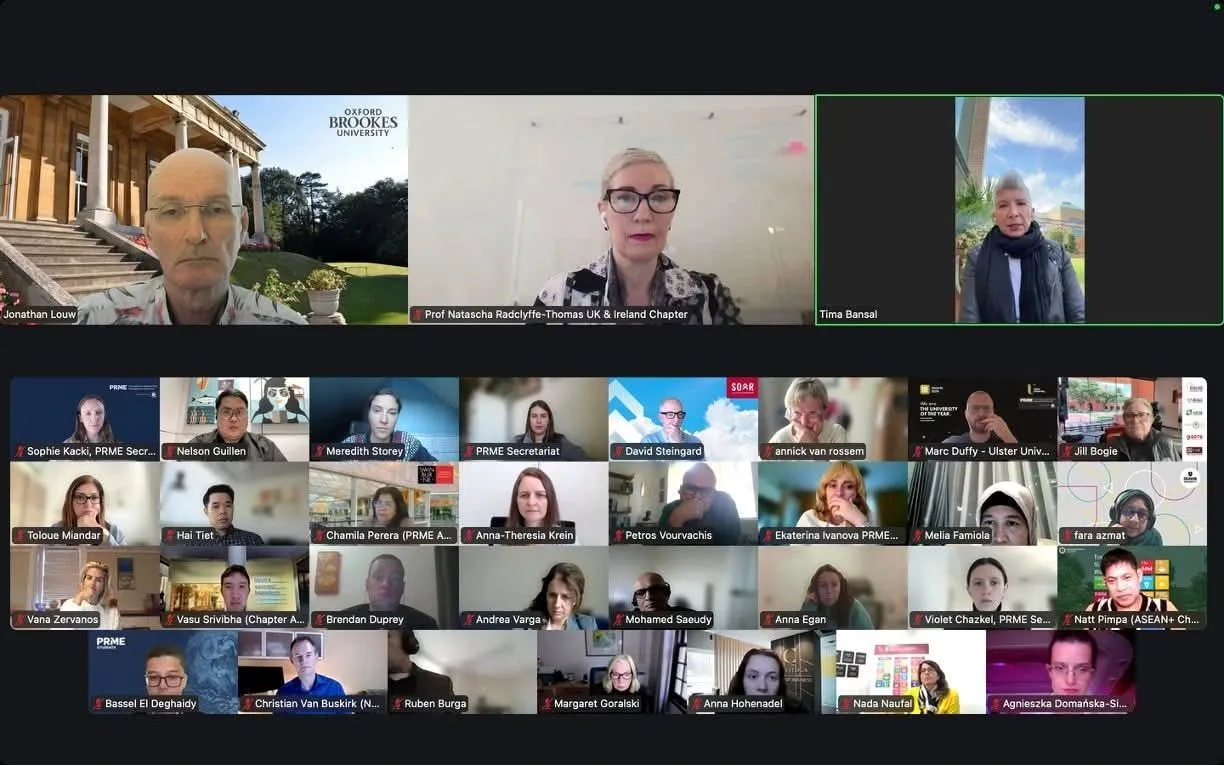Access

- Submit your institution’s Sharing Information on Progress (SIP) Report
- Access SIP reporting across institutions
Access

Access


The 6th Annual PRME Global Chapter Forum is a virtual event that brought together 88 individuals from PRME Chapters’ leadership, the Secretariat, and the Advisory Board. It provided a dynamic, cross-regional space for Chapters, their Steering Committees, and engaged members to connect, share insights, and highlight the impactful work happening both locally and globally.
Opening the session, Meredith Storey, Senior Manager of Programmes and Engagement, PRME Secretariat, and Dr. Jonathan Louw, Oxford Brookes Business School, PRME Global Chapter Council, welcomed participants from around the world, highlighting the growth of the PRME network and the Forum’s role in connecting a global community of educators and practitioners dedicated to contextualizing the work of PRME at a local level.
Leadership During Transition
The day began with a three-way reflection on leadership featuring Meredith Storey, Sophie Kacki, Manager of Programmes & Engagement, PRME, and Dr. Tima Bansal, Chair, PRME Advisory Board. The discussion acknowledged PRME’s recent leadership transitions while celebrating the stability and momentum maintained by the Secretariat and the strength of the regional Chapters.
Dr. Bansal provided context on the evolution of PRME’s governance and Advisory Board, noting the adoption of the new terms of reference that clarify its advisory role within the UN Global Compact structure, positioning PRME for stronger strategic alignment going forward. Participants discussed the value of PRME’s relationship with Global Compact under the One Global Compact vision, as well as ways to expand collaboration and visibility across both academic and business communities.
Looking ahead, three priorities were identified for PRME’s future: advancing pedagogy for responsible management, improving the PRME Commons as a shared learning space, and strengthening opportunities for global and regional convening.
Meredith and Sophie reflected on the Secretariat’s motivation through the transitions, emphasizing the energy and resilience of the PRME community. “The community is what keeps us focused and motivated,” Kacki said. “The movement continues to grow because of the passion and volunteerism of members around the world.
Innovation Across Five Key Themes
Breakout sessions highlighted innovation across the following topics: Art in Responsible Management Education; Pedagogy; Climate Action; AI & Emerging Technologies; and Careers & Sustainability. Art-based approaches were celebrated for fostering empathy, perspective-taking, and creativity, with examples ranging from theatre, film, and design thinking to culinary and visual methods. Participants expressed interest in forming an Art for RME Working Group to continue exploring these approaches through webinars, podcasts, and collaborative projects.
Pedagogical innovation and sustainability were central themes, with Chapters sharing SDG-focused teaching, community projects, and cross-cultural experiential learning. Discussions emphasized creating a platform for exchanging teaching practices, integrating research into curricula, and enabling collaborative initiatives. AI and emerging technologies were recognized for their potential and challenges, with initiatives like the upcoming Emerald & PRME Journal of AI & RME, a dedicated Working Group, and Sustainability Excellence Training with AI equipping students and academics with responsible, multidisciplinary approaches. Careers discussions built on the Sustainability in Early Careers research, exploring ways to expand sustainability-focused opportunities and cross-Chapter collaboration.
Storytelling for Impact: Sharing Communication Strategies Across Chapters
The Forum’s communications breakout highlighted how regional Chapters are using storytelling to build engagement and drive impact, with an emphasis on the regional differences. Dr. Marc Duffy and Dr. Anna Egan from Chapter UK & Ireland, Dr. Nattavud Pimpa from Chapter ASEAN+, Anna Hohenadel from Chapter North America, and Dr. Jill Bogie from Chapter Africa shared strategies for communication, student involvement, and regional outreach.
Chapters showcased a range of creative initiatives. The ASEAN+ Chapter’s student “sustainability ambassador” projects, podcasts, and the unique use of a “reality TV for the SDGs” activity, have attracted strong public interest. The North America Chapter has established a central Secretariat at Conestoga College to streamline communication and operations. The Africa Chapter emphasized the importance of consistent content creation and building capacity across a vast region.
Common themes emerged: the power of local storytelling, collaboration with institutional communications teams, and cross-promotion - including repetition of messaging across platforms - to extend reach. Participants also reflected on the importance of balancing emotional engagement with substantive learning outcomes.
Confronting Global Challenges
The Forum concluded with a powerful panel addressing retreats from DEI and Net Zero commitments by some governments and organizations in the wake of US administrative shifts. Steve Kenzie, Executive Director of Global Compact UK, Herve Lado, Regional Manager of the UN Global Compact Africa Hub, and PRME Student Regional leader for Africa Bassel Deghaidy joined Dr. Louw to discuss how the business education community should take an active role in championing sustainability in challenging times. Mr. Lado and Mr. Kenzie both reflected on how the US taking a step away from sustainability initiatives has affected other countries, regions, and corporations - sometimes in a positive direction. Some are using the moment as an excuse to prioritize sustainability, while others are taking the opportunity to step up and differentiate themselves. Mr. Kenzie noted the importance of academia supporting the advancement of the business case for sustainability, a key pillar in the new UN Global Compact strategy.
The panel emphasized that during times of political and social headwinds, the work of responsible management education becomes even more critical. "There's a lot of people relying on us for their voices to be heard," Bansal noted earlier in the day. "As a community at large, let's not back away. Let's move forward."
Continuing the Momentum
In closing, Dr. Louw and Meredith thanked participants for their commitment and invited all Chapters to remain active in shaping PRME’s future through the Advisory Board nominations, the upcoming 2026 Global Forum, and the ongoing expansion of student and faculty networks.
"It's a uniquely driven community. It's a community of volunteers, and the amount of time and energy and effort that the community puts in just of their own passion outside of their day jobs is really always so impressive and so motivating." – Sophie Kacki, Manager of Programmes & Engagement